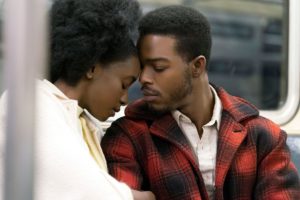If Beale Street Could Talk
Posted on December 27, 2018 at 12:08 pm
A| Lowest Recommended Age: | Middle School |
| MPAA Rating: | Rated R for language and some sexual content |
| Profanity: | Strong language |
| Alcohol/ Drugs: | Acohol |
| Violence/ Scariness: | Some peril and violence, references to rape |
| Diversity Issues: | A theme of the movie |
| Date Released to Theaters: | December 25, 2018 |
| Date Released to DVD: | March 26, 2019 |

When I interviewed writer/director Barry Jenkins about “Moonlight,” we talked about the movie’s haunting score, composed by Nicholas Britell. “Many directors would use songs of the era to place the audience in the film’s three time periods,” I said. “Two things,” he replied. “First, we could not afford the rights to those songs. But more important, I believe these characters deserve a full orchestral score.”
I thought of those words as I watched Jenkins’ latest film, “If Beale Street Could Talk,” based on the 1974 novel by James Baldwin, my #1 film of 2018, and winner of the Best Director, Best Supporting Actress and Best Film Spirit Awards. There were moments when it did not feel like I was watching the film. It was more like I was immersed in it, as though I could feel it pulsing through my veins. The entire theme of the movie could be, “These characters deserve a full orchestral score” along with the highest level of every other creative and aesthetic element available to a filmmaker, from Baldwin’s lyrical words to the luscious cinematography of “Moonlight’s” James Laxton, another gorgeous score by Britell, costumes that carry the narrative and illuminate the characters, and performances of infinite sensitivity and humanity.
“If Beale Street Could Talk” succeeds brilliantly at one of cinema’s most central functions: a love story with sizzling chemistry between two impossibly beautiful people. Stephen James (“Race”) and newcomer Kiki Layne are 2018’s most compelling romantic couple, pure pleasure to watch. Their relationship is in every way the heart of this story, the reason we feel so sharply the injustice and, in some ways harder to accept, the resignation that is the most undeniable signifier of generations of institutional racism. We see that most powerfully when Oscar-winner Regina King, as the girl’s mother, looks in the mirror as she prepares like a matador entering the bullring for a meeting that could make all the difference for the couple. She cannot expect much, but she has to try. Throughout the movie, there is resignation and diminished hopes but there is also resilience. And “Beale Street” reminds us that undiminished and imperishable love abide: romantic love, the love of parents and siblings, even an unexpected encounter with a warmhearted landlord. There is the love Baldwin and Jenkins have for these characters. And, most of all, it reminds us that this is a story that deserves to be told with the best of what movies have to offer, including a full orchestral score.
James and Layne play Fonny and Tish, childhood sweethearts who are young and deeply in love. He is wrongfully arrested for rape by a bigoted cop with a grudge and is in jail when Tish tells him that she is going to have a baby. We see what happened before and what happens after in a jazzy, non-linear form, luscious images and exquisite performances. This film is a masterpiece, like its characters of a time nearly half a century ago, “ready,” and exactly right on time.
Parents should know that this film includes explicit sexual references and situations, references to rape, unjust charges and abuse of the justice system, racism, and some peril and violence.
Family discussion: Why does Sharon take off her wig? Why do the mothers respond so differently to the news of the baby?
If you like this, try: “Moonlight” from the same writer/director and the books of author James Baldwin
